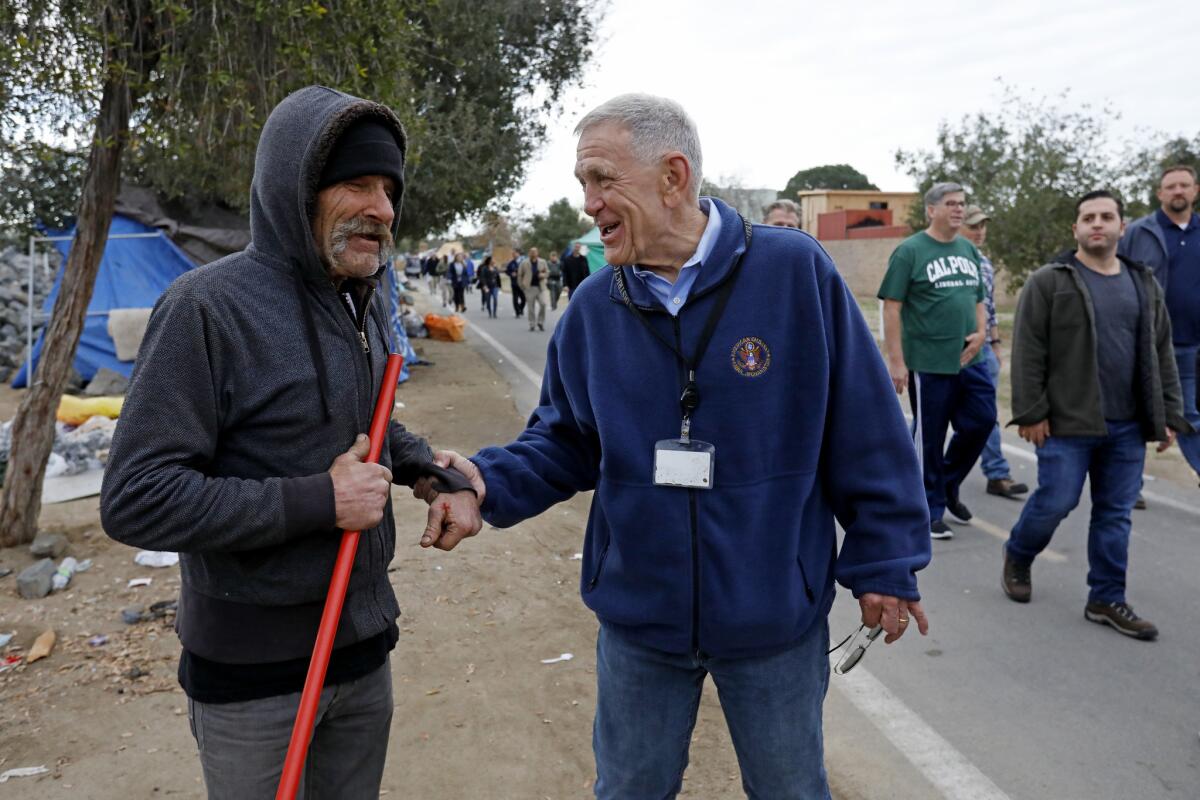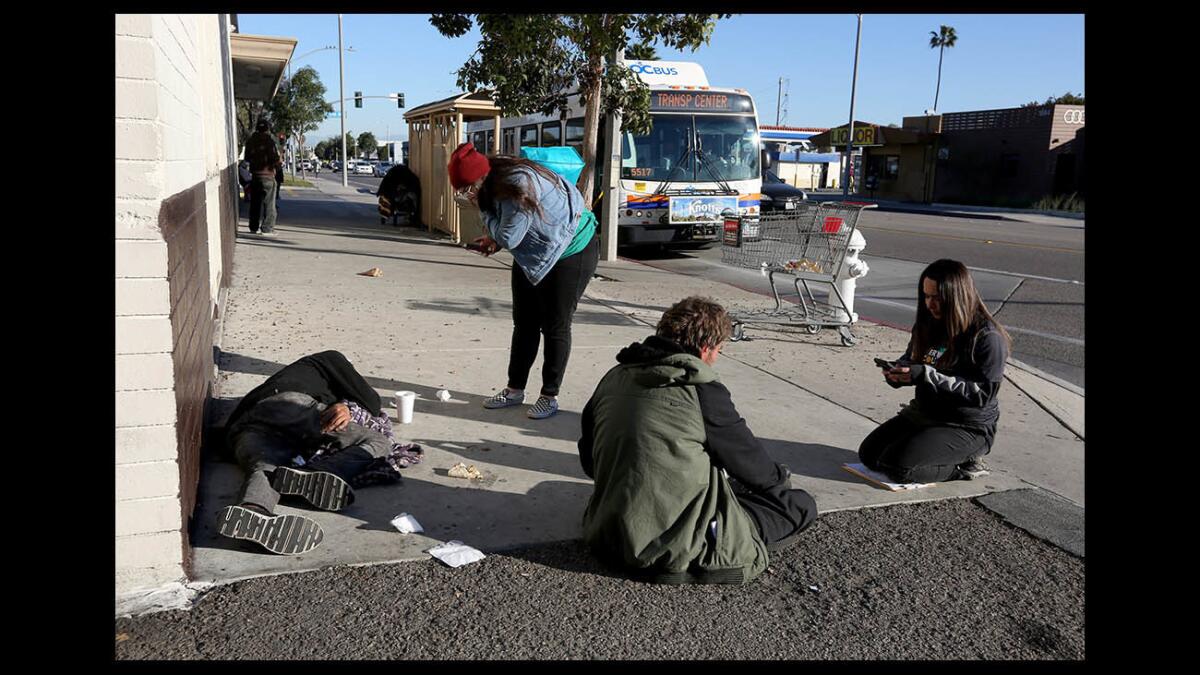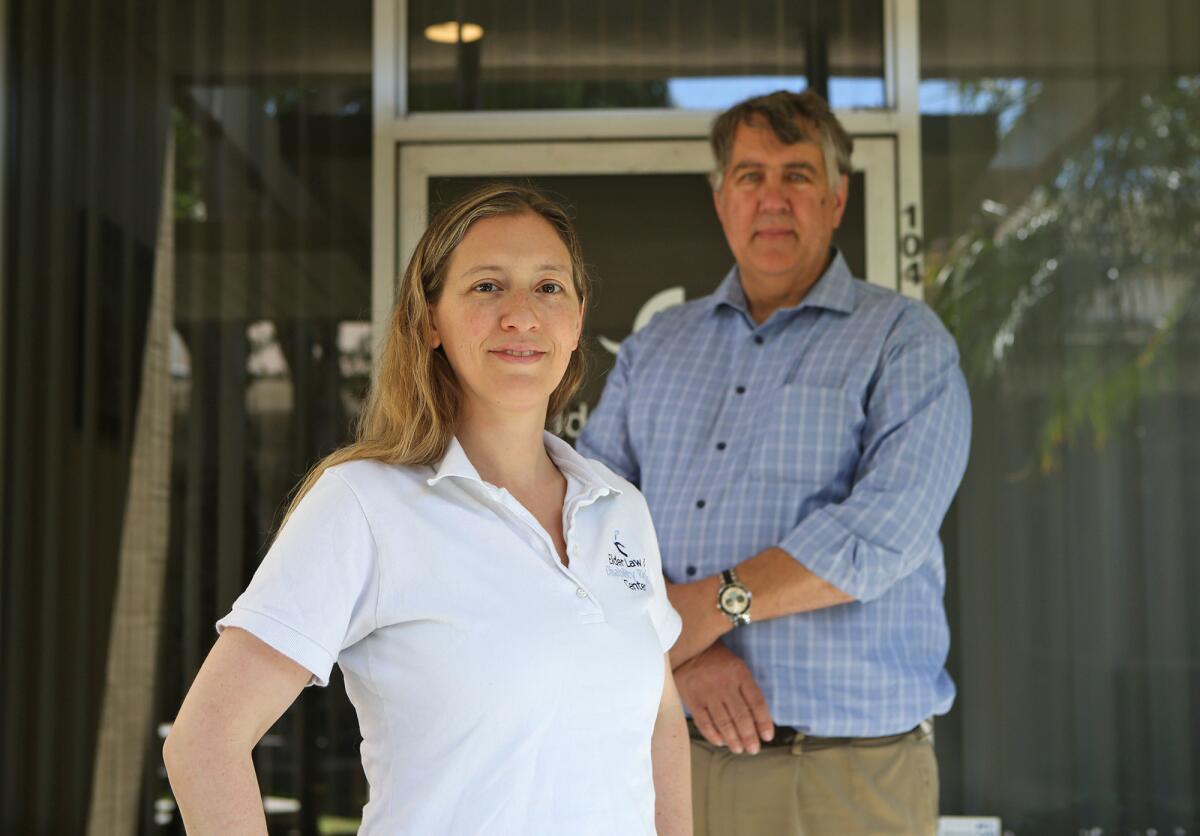Laguna Beach and Santa Ana are latest cities to settle in landmark Orange County homelessness case

Laguna Beach and Santa Ana have reached settlement agreements on a federal lawsuit that continues to shape the way Orange County deals with spiraling homelessness.
The two cities joined several others in the county that have already agreed to provide shelter beds as well as take a “healthcare-first” approach to dealing with the homeless.
Laguna Beach will continue to operate its Alternative Sleeping Location, a small shelter with 45 beds. It’s the only low-barrier emergency shelter in south Orange County.
Santa Ana agreed to open another 200-bed homeless shelter. The city already has a 200-bed shelter, the Link, and the county-run, 425-bed shelter, the Courtyard.
The settlements require that health professionals assess homeless individuals and seek to find adequate shelter based on their health needs.
Anti-camping and loitering laws can be enforced only if an un-housed person refuses the bed. Each city must also have and work toward offering shelter beds for at least 60% of its homeless population.
This healthcare-first approach has become central to many of the settlement agreements of the lawsuit, which was launched by the Orange County Catholic Worker in early 2018 after the removal of a tent city near Angel Stadium.
So far, Anaheim, Costa Mesa, Tustin, Orange and the county have settled. Settlements were also signed with the 13 cities in Orange County’s North Service Planning Area, which includes Villa Park, Yorba Linda, Placentia, Brea, La Habra, Buena Park, La Palma, Cypress, Los Alamitos, Stanton, Fullerton, Anaheim and Orange.

Brooke Weitzman, one of the lead attorneys on the case representing the Orange County Catholic Worker, praised Santa Ana and Laguna Beach for proactively settling. Neither city was sued.
“Santa Ana has been a leader in taking steps first in the county, and Laguna is really stepping out and saying we will be a leader in south county,” Weitzman said Monday following the settlement hearing in a Santa Ana courtroom. “They are saying, ‘We will show south county the way in which solutions work.’
“For us anything that has more people not dying in the street is a great win.”
U.S. District Court Judge David O. Carter, who is overseeing the case, praised Laguna Beach on Monday as “exemplary.”
In a court presentation, Carter pointed out that cities have been “dumping” their homeless on Laguna. He specifically cited that Aliso Viejo had 28 homeless individuals in 2017, but a year later the homeless count dwindled to one, the remainder ending up up in Laguna’s shelter, Carter said.
“We are really pleased with this settlement, and it is consistent with this [City] Council’s approach to matters of this kind,” Laguna Mayor Pro Tem Steve Dicterow said in a statement. “We want to balance the rights of individuals with the rights of the public to public safety.”

Also at the meeting, Fullerton city officials announced a partnership with the nonprofit Illumination Foundation to open a facility with 60 recuperative care beds for ill homeless individuals and 90 “navigation” beds to transition homeless individuals to permanent housing.
“We are hoping to continue to work with the cities,” Weitzman said, “to the extent there are jurisdictions willing to work with us preemptively on solutions and come in on settlements under the potential future litigation before we file anything. It saves everyone time and money, and it gets more done faster to help save lives.”
Weitzman said Carter will continue to monitor the progress of the cities and county in dealing with homelessness. More hearings may be held as the Catholic Worker and judge work with the municipalities.
“This is just the beginning,” Carter said. “This is not a day of victory laps.”
Also at the hearing, Carter mentioned an “appalling” letter addressed to CalOptima, Orange County’s health organization for the poor, from business leaders of local hospitals.
In the Aug. 12 letter, hospital leaders asked CalOptima to overturn a decision months ago to devote $60 million to specialized medical programs aimed at reducing homeless deaths. CalOptima has in total chosen to devote $100 million toward these programs, which includes sending mobile clinical teams into the streets to directly treat the ailing.
Carter said there will be a hearing to address the letter.
“CalOptima appreciates our partnership with Orange County’s provider community,” agency spokeswoman Bridget Kelly said in an emailed statement. “At the Sept. 5 Board meeting, a board member mentioned the provider letter and directed staff to return with recommendations on parameters the board could apply when considering funding and approving specific homeless health initiatives. CalOptima remains committed to ensuring that our members who are experiencing homelessness have access to the Medi-Cal covered services they need.”
All the latest on Orange County from Orange County.
Get our free TimesOC newsletter.
You may occasionally receive promotional content from the Daily Pilot.




